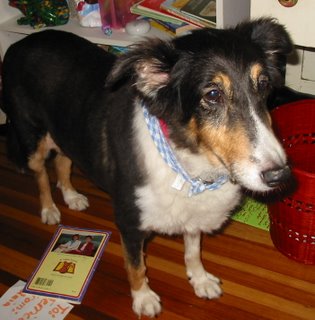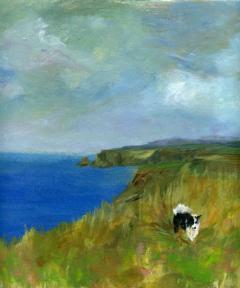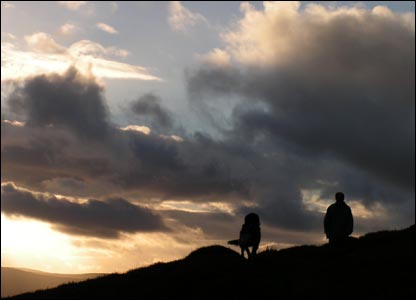 About 8:00 this evening, I look up from my tedious proofreading work and see a dog dancing. She's our dog, Hera – a Shetland Sheepdog, or Sheltie. This little dance she does is something imprinted deep in her genes. Her ancestors used to do it to round up the sheep, dancing along in ever-tightening circles until they finally had the dumb beasts where they – and their shepherd masters – wanted them. Hera sometimes does this little dance with our three cats, which is highly amusing – although not very effective, since "herding cats" is a classic definition of futility.
About 8:00 this evening, I look up from my tedious proofreading work and see a dog dancing. She's our dog, Hera – a Shetland Sheepdog, or Sheltie. This little dance she does is something imprinted deep in her genes. Her ancestors used to do it to round up the sheep, dancing along in ever-tightening circles until they finally had the dumb beasts where they – and their shepherd masters – wanted them. Hera sometimes does this little dance with our three cats, which is highly amusing – although not very effective, since "herding cats" is a classic definition of futility.Tonight, I think she's herding me. I've been sitting for way too long. It's time to get out, out into the night.
And what a night it is! It's one of those cool, crisp spring nights, that follows a day warmer than most. Deep in the summer, a night like this would be equally lovely, but the heat and humidity would still be hanging on, oppressively. Tonight is different. Tonight, conditions are absolutely perfect for a walk around the block, dragged along by a loopy dog who's eager to sniff in the grass and at the foot of telephone poles for pheromones left by her fellow canines.
 This night was out here, waiting for me, all along. And I nearly missed it. Thank you, Hera, for seeing to my mental health.
This night was out here, waiting for me, all along. And I nearly missed it. Thank you, Hera, for seeing to my mental health.In Thornton Wilder's play, Our Town, the ghost of Emily Webb – a young woman who has died tragically young – pauses to visit her hometown of Grover's Corners, New Hampshire one last time before she moves on to the afterlife. It's time for her to go, she knows, but Emily lingers, turning around for one final look. "Oh, earth," she says, drinking it all in, "you're too wonderful for anybody to realize you!"
Emily turns, then, to the Stage Manager – that all-knowing character in Wilder's play who serves as a sort of narrator. She asks him, through her tears, "Do any human beings ever realize life while they live it? Every, every minute?"
"No," replies the Stage Manager. "The saints and poets, maybe – they do, some."
Saints and poets and Sheltie dogs – and the grateful people they drag along with them.
